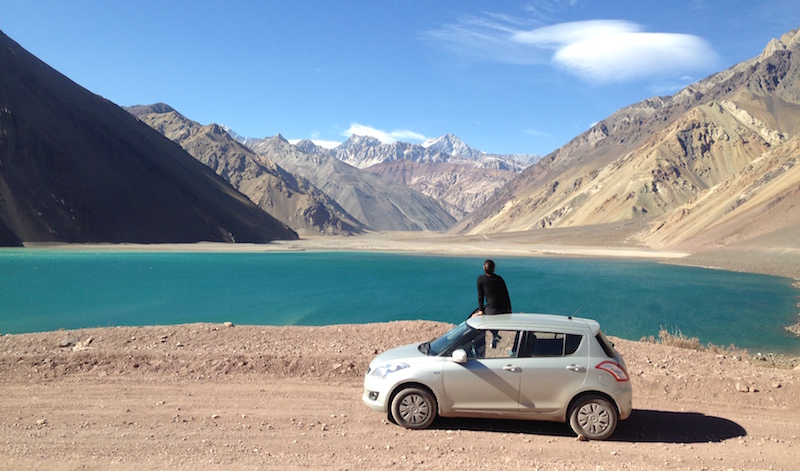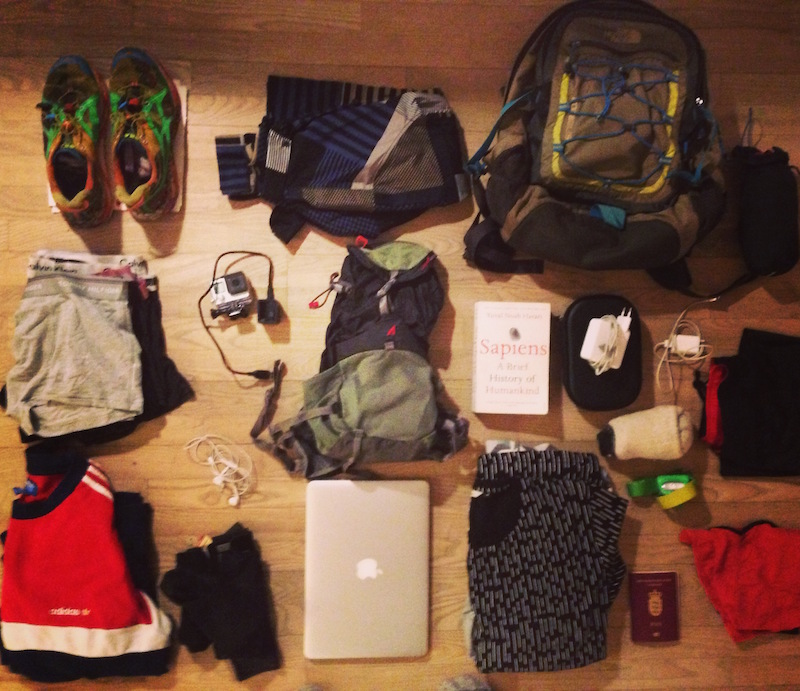
20 Homes in 2 Years: Living on Airbnb

This is Michelle, my girlfriend, working from a café in Barcelona just a few months after she started her own business and we started our new life. Here is what the last two years have looked like:
- We’ve been to Spain, Italy, Belgium, Luxembourg, Russia, Kenya, Morocco, Brazil, Chile, Poland, Slovenia, Croatia, Slovakia, Austria, Malaysia, Sri Lanka, Thailand, Cambodia, Vietnam and Indonesia.
- Our shortest Airbnb stay has been one night. The longest 5 months.
- We started out thinking this was just a trip for a period, but slowly we’ve started to consider it a permanent way of living
- Surprisingly we have started to feel at home almost everywhere. We have discovered that home doesn’t have to a physical place.
- We have had an average monthly rent of approx. $1150, but overall spend less money than we did when we lived back home in Denmark.
- Unintentionally, we have become minimalists along the way.
Here is our story:
The decision
A few years ago my girlfriend and I decided, that we wanted to see if we could combine work with the dream of traveling more. She just finished her masters and we made a pretty simple deal: We decided that for one year, she would try to start her own business, while we were traveling. If we got tired of traveling or if she didn’t like or didn’t succeed with starting her own business, we would move back to Copenhagen.
Worst case scenario was that we would have had a bunch of great experiences. She wouldn’t have had been away from everything so long, so she could easily apply for a corporate job like her friends from university. We had savings to survive that year, so it was more or less risk free.
A few years prior to this decision, we both lived in Beijing in China, because she was doing her masters there. It was a great experience, but also challenging. Living in China is not easy and to be honest, I had difficulties finding a good rutine and feeling at home, just working on my own projects from cafés in the insanely cold Beijing winter.

Weekend adventure when we stayed 3 months in Santiago, Chile.
Nevertheless, after one year back home in Copenhagen, we really felt like living abroad again. We got some really valuable experiences in China, both practically and as a couple, as a team. In China we did everything the normal way. Finding an apartment through an agency, big contract, big deposit, buying a lot of stuff for the apartment, signed up for electricity, heating and so on. Our power was like a prepaid simcard, so sometimes it just stopped working and we had to go to the bank to fill it up. Too bad if it was Sunday.
While all of these experiences are a part of getting to know a country, we decided that this time we wanted to focus more on actually enjoying the places we went to instead of practicalities. I consider myself a minimalist. I hate stuff and things that takes my time and energy, but doesn’t really create value. So what is a better solution than Airbnb? Booking everything online, having everything included (like sheets and towels), cleaning when you’re leaving etc. It’s great for short term vacations, but we actually learned that practically and financially, it’s even better as a permanent way of living.
It’s cheaper to travel the world than staying back home
In 2015 we spent 219 nights on Airbnb. That’s exactly 60% of the year. Those stays were spread over Morocco, Chile, Italy, Spain, Kenya, Belgium and Luxembourg. Our average monthly rent on Airbnb was $1.150 (per 30 days). That is under $50 more than we paid for our apartment in Copenhagen.
Digging a bit deeper I exported all our records for the last 6 months of 2015, where we were traveling and compared them to a period of 6 months were we had a lived back home. The results? We saved 10% while traveling around, compared to staying back home. The interesting thing was, that this included everything: flights, eating out, experiences, stuff etc.
We made one mistake in 2015 though. We had too many short term stays. In a few occasions we planned too late / too spontaneous stays around Europe. That’s expensive and something that can easily be optimized. If you stay a month or longer at many Airbnb listings it can dramatically effect the price. If you find a listing where they have a monthly price noted, then they are interested in renting out for longer periods and our experience is that it’s often possible to negotiate a bit with the hosts.
My goal for 2016 is that we will be spending approx. 75-80% on Airbnb. The rest of the year with Refuga, visiting friends and family and occasionally hotels and hostels. The goal is to keep the costs around 80-85% of the total costs we had in Copenhagen. Being better at planning should more or less do the trick. The year will be spend both in low costs countries like Cambodia, but also expensive places like Japan and at least 3 months in Europe. When people ask me how we can afford to travel like this, I ask them how they can afford to stay at home.
Only a back bag: No home, no stuff, no worries
What I’ve slowly learned while living permanently on the road, is that stuff just doesn’t have that big of a value. If you don’t have anywhere to put your stuff, it just means you’re not buying stuff. You only focus on the things you actually really need. I don’t wanna carry a lot of stuff around in my back bag from place to place every second week.
This might sound simple, but we’re on average living in much bigger houses than 50 years ago, but an industry like the self-storage industry is booming. We have so much stuff that we don’t even know where to put it. It’s ridiculous.
Getting rid of stuff of course saves you money, it’s better for the environment, it declutters your life and I really believe that lifes are better when owning less stuff.

My stuff for 4 months traveling and working in Asia, including everything for work (a MacBook + noise-canceling head phones), everything for adventure (running shoes, head lamp + GoPro) and everything for everyday life (6 pairs of boxers).
It’s funny because we’re actually storing a few things back home in Denmark. Maybe around 5-6 boxes with stuff. Guess what? We’re not missing anything and we can’t remember what’s in the boxes. It’s ridiculous.
I travel most of the year with one back bag and my girlfriend travels with one back bag and one suitcase (she’s a girl, they need more stuff than us guys). Here is what I’m traveling with for the first 4 months of 2016:
One pair of running shoes, one shirt, a big back bag, 7 pairs of boxers, a GoPro with 2 batteries (died in Sri Lanka a month ago, guess it wasn’t 100% water proof), a pair of Bose headphones (amazing for flying and working from cafés), a pair of big socks, running shorts, a running shirt, a sweater, 3 pairs of socks, a Macbook, a head light for night hiking, one pair of long pants, two shorts and of course a passport.
Does home necessarily need to be a physical place? The art of feeling at home, when you don’t have a home.
One thing is the financial and practical side of things. Another thing is how you’re feeling at the places you’re traveling to and how much you miss home.
Over the last two years I have seen our mindsets change. We started out as just being travelers. We were traveling for a period of time and some day we were going home to Denmark again. But now we feel more and more home almost always, no matter where we are. When being in Denmark now, I feel like we’re visiting instead of going home.
At some point during the last two years we hit a tipping point. Now home is just where we are together and it’s not based on one specific address.
This wasn’t intentionally, but something that just happened. The reason, I think, is because we are a couple traveling together. We’re lucky that our relationship is just growing and getting better as we travel and spend time together. We spend almost all time together and it’s not given that, that is good for a relationship. It’s been incredible for us and I feel extremely lucky about that.

Having dinner at a banana leaf restaurant with Andrew, our Airbnb host in Kuala Lumpur. One of the many friendly hosts we have stayed with and become friends with. By the way, this is some of the best veg food I’ve ever had. If you’re in KL, you can find Andrew’s Airbnb listing here and the restaurant here.
I couldn’t live like this on my own and I understand why most “digital nomads” traveling alone just do it for a short period and turn back to a more conform way of living.
One thing we’re trying to do more and more, is to rent a room instead of renting the whole place. If you find the right hosts, it can be a great experience to live with locals. While more and more people are having a super professional approach to renting out via Airbnb, there is still a lot of people who host because they want to earn a bit extra money and meet other people. My experience is that it’s pretty easy to find these by reading their reviews. It’s always obvious in the reviews if it’s someone just renting out or someone actually interested in meeting people.
Living with locals is just a great way to get a better start in a new city. We often get invited out for dinner, get introduced to other people etc. It just makes it easier (and more interesting), when you’re just arriving in a new country.
Our future
I know. It’s pretty normal for young people to be idealistic and have big dreams and then end up living a more than typical life with two kids, a dog and house. Maybe I will also move back to the city where I grew up some day, but I can’t stop thinking that living like this could be more or less permanent.
I often hear from others, saying that we can only do this because we don’t have kids. Maybe they are right. But home schooling is a growing trend and I for one, would love not to put my kids through a normal school (I hated it pretty much all the way through), so why shouldn’t that be a solution?
I guess it’s normal that you want to be close to your family when you get kids, but we could relocate to cities in Europe, just a cheap 1-2 hour flight or a day driving, away from our families back home in Denmark. I know nothing about having kids, but I don’t see having kids stopping us from traveling or living abroad. The pace and style would just be different.
For now it’s working, we’re enjoying it, we feel incredibly lucky and we don’t miss staying in just one location. So I think and hope that the future for us will be living like this, but only time will tell.
There is something wrong with the our existing housing form. Could a nomadic lifestyle be the norm in 50 years?
More and more a freelancing – In the US more than 1 out of 3 people are freelancing and more and more companies are using remote employees instead of having one fixed office and just hiring from the surrounding area (talent is everywhere, not just within an hours commute of your office). At the same time more people than ever have reached the top of the famous hierarchy of needs by Maslow, so what’s next? After we have a safe place to stay, enough food, a good job, more stuff than we need and prestigious jobs, then what’s next? I think freedom and experiences is high on most peoples lists.
So there is a lot of reasons why more and more people will live like this, but could it potentially also be a better solution than how we live now?

My girlfriend, Michelle, on the way to the summit of the highest point of the european continent, Mount Elbrus in Caucasus in Russia. Beats being stuck back home with a mortgage.
We have mortgages that almost imprison us. We pay with our freedom, to get a big house that we can fill with stuff we don’t need. My definition of a home is a base, somewhere you can relax, recharge and be free. How can a house give you that, if you’re stuck in loans and you’re spending most of your ressources in the best years of your life on paying your house.
The housing market and our extreme overspending is some of the biggest reasons we just had a financial crisis and the big problems we have with the environment.
At the same time the world’s wealth is incredible unequally distributed. There is almost one billion people who doesn’t have enough food and almost 3 billion people living for under $2 per day, while others are filthy rich.
Tourism is one of the world’s biggest industry. Besides employing 1 out of 11 people, the industry is 10% of global GDP. At the same time it’s one of the most effective ways of distributing wealth from those who have a lot, to those that don’t have a lot. It’s also the best way to understand other cultures and people. The better we understand each other, the better a world we should have. I really believe that traveling contains the biggest potential to change the world for the better.
I think being more nomadic could be a better solution for a lot of people, but also for our world. With more nomads, we would have less people in insane debt, we would take better care of the environment and we would distribute the world’s wealth more equally. And I think we would be happier at the same time.
I don’t think living nomadic is just a trend. It’s here to stay and I hope that some day more people will be living like this and owning a big house full of stuff in their garages.
A lifestyle just for the most lucky people of our planet – for now.
If you earn more than $32.400 per year you’re among the 1% richest people in the world. It’s an incredible fact, that changed how I looked at the world.
While I have always been a bit naive, I know that I’m extremely lucky. The average salary in Denmark is around $42.700 per year and we have one of the best social security systems in the world. I have one of the absolute best fundations possible, to actually go out and do what I want. I even have one of the best passports in the world.
Living like this is easy for me. But for a Kenyan, who is better educated and more hardworking than me, a life like mine is almost utopia. I feel incredibly lucky, but at the same time I hate that things are like this.
Critics would say that I take advantage of being from a well-off country and geo-arbitage to travel, while I help destroy the environment because I fly a lot of miles each year. It’s a fair point.
The way I’m living is not perfect. It’s just better than what I did before. I know living like this is not possible for everyone, but if more people from the western part of the world bought less stuff, traveled more to understand the world and distribute wealth and drop wasting their lives paying off their mortgages more people who be happy and it could help change the world.
Hopefully, one day more people will have the the same opportunities as I was born with. This lifestyle is not the solution, but maybe it can be small part of it.






KOMMENTARER
Hi
You talk about traveling/ working for 2 years. But what is it that allows u to do this?!? What is this business that you do?! Is it just programing remotely? How do u get nee cliente while in combodia?
Sorry im not trying to nosey…but to understand how one fund such a lifestyle as i wòó uld love to be doing it myself.
Thanks
May
Hi May,
Thanks for commenting. I’m running a small project called Refuga. I’m traveling with my girlfriend and she is a self-employed consultant. We actually have a pretty normal work life, working around 35-45 hours per week 🙂